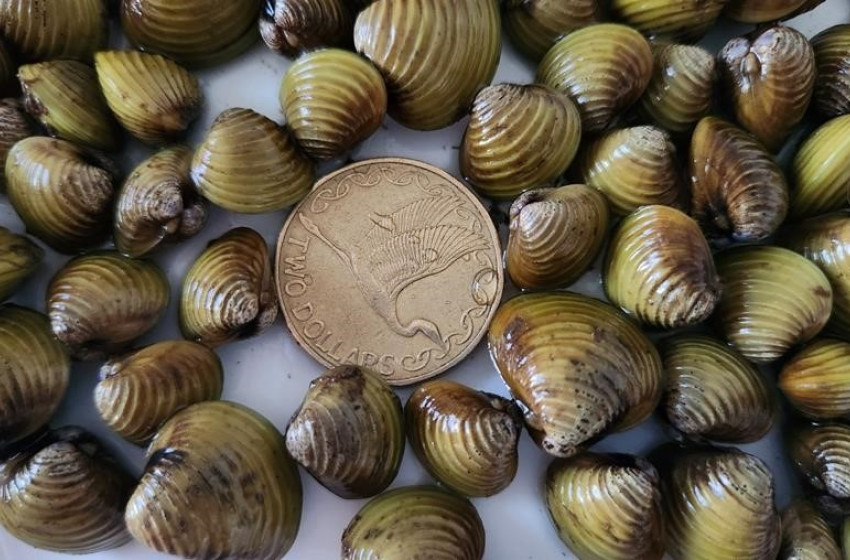Important gold clams update
- 31/10/2023

We want to let you know that unfortunately Lake Ōkataina in the Rotorua region will not be open for angling from boats this Wednesday 1st November, as planned.
The Controlled Area Notice is being extended for up to two weeks, meaning the lake will remain closed to boating and fishing.
Biosecurity New Zealand is the lead agency for the response to the clam, and has responded to a specific request from iwi by agreeing to temporary biosecurity rules which closed the lake to boating and fishing for the month of October while a wash station was established.
The extension gives Biosecurity New Zealand time to work through the required approvals for the mobile wash station that will go on Lake Ōkataina Rd. Biosecurity New Zealand also requires 2-3 days for earthworks and to thoroughly test the wash station before the lake can open to fishing and boating.
We understand that this news will be disappointing, especially with the angling season in full swing across the rest of the country.
We can however provide you with the proposed information on the access arrangements at Lake Ōkataina once the mobile wash station is operational:
- The aim is to have the lake open for angling from Thursday to Sunday, including overnight boat stays (anglers must be off the water by midnight on Sunday)
- The wash station will be available for use from 6:30am to 7:00pm.
- It will take approximately 10 minutes for a boat and trailer to go through the wash station.
- All boats, including those from Rotorua, will be required to use the wash station, for now.
- A gate will be installed at the boat ramp and will be locked and opened in support of the lake and wash station hours. An emergency contact number will be posted at the boat ramp.
Shoreline fishing will still be allowed seven days a week, but waders may need to undergo washing. It should be noted that any fishers who have recently been in the clam infested part of the Waikato River are required under law to appropriately check, clean and dry boats and equipment before moving to another waterway. Advice on this can be found here.
We understand that the operational hours may be inconvenient for some anglers, but this is due to staffing capabilities at the Bay of Plenty Regional Council and Te Arawa Lakes Trust.
Biosecurity New Zealand is actively monitoring the situation and will review these procedures after one month, with the possibility of changes once permanent wash stations are established and the mobile wash station at Lake Ōkataina is removed.
We acknowledge the concerns of mana whenua regarding the gold clams issue and respect their actions in seeking the lake's closure to date.
In addition to these local efforts, Fish & Game has been advocating for a stronger focus at the source of the problem in the Waikato River, where the gold clams were first discovered. We are pleased to report that the first boat wash station i
s now operational at Lake Karāpiro, and plans are in progress for additional stations along the Waikato.
Biosecurity New Zealand has launched a comprehensive awareness campaign to encourage all water users to help prevent the spread of gold clams from the Waikato River to other bodies of water. Here are some key points to remember about these invasive clams:
- Gold clams have been present in the Waikato River for 2-3 years
- They have the potential to outcompete native species for food and habitat
- They have been known to clog water infrastructure overseas
- While eradicating them from the Waikato River is unlikely, containment is possible
- Gold clams are classified as unwanted organisms under the Biosecurity Act, making it mandatory to Check Clean Dry after entering known infested waters.
- Extensive surveillance has detected their presence along a 99km stretch of the Waikato River, from Lake Maraetai downstream
- Early detection and local elimination efforts are crucial. If you come across a gold clam, please take a photo, note the location, and report your sighting to 0800 80 99 66 or online at report.mpi.govt.nz.
- Please be aware that gold clams, while consumed in parts of Asia, are not safe to eat in New Zealand due to their filter-feeding behavior and toxin accumulation
- It is essential to practice the Check Clean Dry method when traveling and accessing rivers and lakes. New requirements have been introduced in the Waikato, including the need to soak absorbent gear, such as life jackets, in hot tap water at 55°C for at least five minutes to eliminate small, sticky juvenile clams that may be hard to see. Detailed Check Clean Dry requirements can be found here.
- You can also download a printable fact sheet about gold clams here.
We will continue to keep you updated on any further developments.
Thank you for your understanding and co-operation.
Corina Jordan
Chief Executive
New Zealand Fish and Game Council